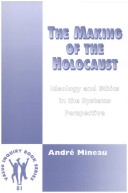What made the Holocaust possible? What does it mean from a moral viewpoint? These two questions constitute the main focus of this book. Through concepts borrowed mostly from systems theory, an attempt is made at establishing a theoretical framework for a broad understanding of the genesis of the Holocaust. More specifically, the relationships between ideology, political power, and genocide are discussed, and the following topics are covered: (1) the constitution and the historical evolution of the ideology of the Holocaust, through the genesis of anti-Semitism, the impact of the modern paradigms, and the apparent peculiarities of Nazism; (2) the emergence of powerful means of action designed for implementing the ideology, in the context of totalitarianism; (3) control and freedom as the basic parameters in a decision-making process that went along with a "diffuse Holocaust" phase and generated mechanisms of extensive cooperation; (4) the values and norms that made sense to the Nazis in relation to the Holocaust, with a critical assessment of Nazi ethics insofar as it aimed at subverting the concept of evil and at destroying the self. This book deals with four key dimensions of the Holocaust: ideology, power, act, and meaning.
- ISBN10 9042007052
- ISBN13 9789042007055
- Publish Date 1 January 1999
- Publish Status Active
- Publish Country NL
- Publisher Brill
- Imprint Editions Rodopi B.V.
- Format Paperback
- Pages 211
- Language English
- URL brill.com/product_id84339
